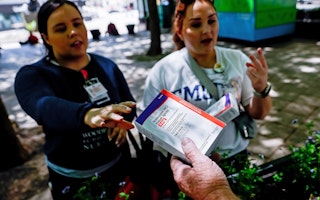Canada’s Supervised Injection Site Isn’t a Legal Matter
By Sarah Evans
The Supreme Court of Canada late last week heard the case of Attorney General of Canada v. PHS Community Services Society. At issue is the future of Insite, a legally sanctioned supervised injection facility in Vancouver, British Columbia.
Europe and Australia both have similar programs, but Insite is the only supervised injection site in North America. At Insite, users self-administer their own drugs under the watch of nurses and paramedical staff. In addition to sterile syringes and other injection equipment, the program offers safer-injection education, hand-washing facilities, a small clinic room, and a post-injection “Chill-Out Lounge” where users can have a cup of coffee, escape from the West Coast rain, talk to peer staff, or make arrangements to enter the Onsite detox program, conveniently located on the two floors above.
It is not a complicated program, but what happens inside Insite’s four walls has become a legal battle bringing a nonprofit society and two drug users face-to-face with the Canadian Government in my country’s top court.
For the PHS Community Services Society, which operates Insite, the battle began— coincidentally— nearly 20 years ago to the day. That’s when Liz Evans, a young nurse, took over the management of a run-down, single-room occupancy hotel in Vancouver’s Downtown Eastside and began figuring out how to house some of the city’s many homeless drug users. For years, the PHS was the only housing provider to offer sanctuary to the so-called “hard-to-house” population: people with complex combinations of mental illness and drug addiction, conditions which seemed to make them impossibly challenging to more traditional service providers.
Since then, the society Liz founded—which has grown and now runs several low-income housing projects as well as health and community services—has been the “pointy end of the stick,” prodding and pushing Vancouver’s housing and healthcare policies to become more inclusive and humane.
It is then no surprise that the PHS has also been at the forefront of the battle for supervised injection. The other Respondents in the case are Dean Wilson and Shelly Tomic, two brave drug users who have bared their personal stories to defend the rights of other addicts.
The first act of this drama took place in BC’s Provincial Courts. Insite finally opened in 2003 with a three-year Exemption from Canada’s Controlled Drugs and Substances Act. As that Exemption came up for renewal, however, the political winds shifted and Stephen Harper became the first Conservative Prime Minister of Canada in more than a decade. The Conservatives made no bones about their views on Insite: after visiting the site, the Federal Minister of Health called it “an abomination.”
An intense campaign failed to convince the Harper government to change their position. Faced with the imminent closure of the site, the PHS, Dean, and Shelly took the Federal Government to court.
After the first hearing in 2008, Judge Ian Pitfield ruled that Canada's trafficking and possession laws are “unconstitutional” when applied to addicts using a supervised-injection site. Because Insite offers lifesaving medical services to addicted persons, it engages Section 7 of the Canadian Charter of Rights and Freedoms, which guarantees “right to security of the person.” In a judgment that went far beyond what anyone expected, the BC Supreme Court judge said Insite should be allowed to remain open for one year without a federal exemption while the federal government rewrote its laws to allow for medical use of illegal drugs if they are part of a health-care program.
Harper’s government appealed. In the second ruling, the majority of judges found that Insite is a healthcare facility and therefore the responsibility of the Province, not the Federal Government (so called “interjurisdictional immunity”).
Nonetheless, Harper’s government appealed again, bringing the PHS, Dean, Shelly, and now the Province of British Columbia to the Supreme Court of Canada.
Last Thursday the Federal Government argued that the legal proceedings had deprived them of their ability to exercise their right to decide on a policy issue. They promised to give the matter due consideration. This is frankly duplicitous from a government which took the words “harm reduction” out of Canadian drug policy and announced their National Anti-Drug Strategy with the words: “The party’s over.”
The Government argued that since illicit substances are consumed there, Insite should fall under federal criminal law. But drugs are not bought, sold or otherwise exchanged at Insite, and any crime has been committed before the participant arrives at the site, so why target the site? As Supreme Court Justice LeBel asked, “Is the concern that addicts would get treated instead of going to jail?”
Canada’s Controlled Drugs and Substances Act allows the Minister the discretion to offer an Exemption from the Act “if, in the opinion of the Minister, the exemption is necessary for a medical or scientific purpose or is otherwise in the public interest.” That’s exactly what happened when Insite first opened, under an Exemption for the purpose of scientific research into the effectiveness of this health intervention. Since then, several million dollars have gone into evaluating the site, and the findings of that research have been published more than 30 articles in highly respected, peer-reviewed medical journals like the Lancet, the New England Journal of Medicine, and others.
The scientific evaluation of Insite suggests that site directly prevents overdose death, stalls the spread of HIV and other blood-born illnesses, significantly increases uptake into detoxification and addictions services— and that it achieves these outcomes without having any negative side effect in terms of local crime or drug use patterns.
Faced with this evidence, governments without an agenda would conclude that the scientific experiment is over, and Insite should be allowed to continue to operate for medical purposes and in the public interest. It could be several months before the court issues its ruling, but as attorney Joe Arvay put it in his opening statement for the PHS: “Any time there is a law that creates a barrier between a sick person and healthcare, especially when that healthcare is lifesaving or life sustaining, then that law deprives that person of his of her life, arguably liberty, and certainly security of the person."
Anyone seeking more information on Insite or its legal case, please contact Liz Evans at liz@phs.ca.
UPDATE: This blog post originally stated the Vancouver Area Network of Drug Users is a plaintiff in the Insite case. In fact, VANDU filed a different case arguing a much broader point that prohibition causes undue stress for people who have the chronic, relapsing disease of addiction. The courts combined the two cases.
Sarah Evans is a division director of Equity for the Open Society Foundations.


